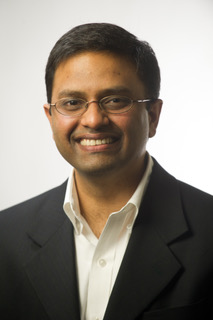
- This event has passed.
MAE Seminar Series: Kripa Varanasi
March 8, 2024 @ 10:00 am - 11:00 am
Title:
Innovations at Interfaces: Energy & Sustainability to Biomedical Applications
Abstract:
Physico-chemical interactions at interfaces are ubiquitous in multiple industries including energy, water, agriculture, medicine, transportation, and consumer products. In this talk, I will summarize how surface/interface chemistry, morphology, thermal, and electrical properties can be engineered across multiple length scales for significant efficiency enhancements in a wide range of processes. These approaches can involve both passive and active manipulation of the interface. First, we will describe a wide range of slippery interfaces that can significantly reduce interfacial friction for efficient dispensing of viscous products, enhance thermal transport in heating & cooling systems, anti-icing approaches, and provide self-healing barriers for protection against scaling. We will describe active approaches such as engineering charge transfer to alter multiphase flows for water harvesting, anti-dust systems for solar, and reducing agricultural run-off to solve important problems at the energy-water and water-agriculture nexus. Next, we will describe our efforts in enhancing electrochemical and biological capture and conversion of CO2. Specifically, I will discuss our recent efforts in enhanced CO2 capture, marine CO2 removal via pH-swing process using electroactive materials, and CO2 electrolysis at high current densities using hierarchical architectures. In parallel, we will discuss biomedical applications where surfaces can be engineered to prevent thrombosis and biofilm formation, tailor cell adhesion and protein adsorption, and can enhance biomanufacturing value chain. Inspired by these slippery surfaces, we present a new methodology to inject highly viscous biologics subcutaneously to expand the range of injectable formulations and make healthcare more accessible. We then describe novel approaches for protein separation via undersaturated crystallization that is promoted via in-situ templating and how such an approach could enable continuous biomanufacturing. Finally, we present both passive and active techniques for preventing foam buildup in bioreactors. Our approach is non-invasive and eliminates the need to use defoamers so that cell-death due to popping of bubbles is prevented and reactor space is optimally utilized. Manufacturing and scale-up approaches, robust materials and processes, and entrepreneurial efforts to translate these technologies into useful products and markets will also be discussed.
Bio:
 Kripa K. Varanasi is a Professor of Mechanical Engineering at MIT. He received his B.Tech from IIT Madras, India and his SM (ME and EECS) and Ph.D from MIT. Prior to joining MIT as a faculty member, Prof. Varanasi was a lead researcher and project leader at the GE Global Research Center. At GE he received many awards for his work including Best Patent, Best Technology Project and Leadership Award. At MIT, the focus of his work is in understanding the physico-chemical phenomena at interfaces and developing novel materials, devices, and products that can dramatically enhance performance in energy, water, agriculture, transportation, medical, and consumer devices. He is passionate about entrepreneurship and translating technologies from lab to market. He has co-founded multiple companies including LiquiGlide, Dropwise, Infinite Cooling, Alsym Energy, AgZen and Coflo Medical. Time and Forbes Magazines have named LiquiGlide to their “Best Inventions of the Year”. His Infinite Cooling project has won first prize at DOE’s National Cleantech University Prize, first prize Rice Business Plan Competition, first prize Harvard Business School Energy & Environment Start-up, first prize at MIT-100K, first prize at MassChallenge. Prof. Varanasi has received numerous awards for his work NSF Career Award, DARPA Young Faculty Award, SME Outstanding Young Manufacturing Engineer Award, ASME Bergles-Rohsenow Heat Transfer Award, Boston Business Journal’s 40 under 40, ASME Gustus L. Larson Memorial Award for outstanding achievements in mechanical engineering, APS Milton van Dyke award, and MIT Graduate Student Council’s Frank E. Perkins Award for Excellence in Graduate Advising.
Kripa K. Varanasi is a Professor of Mechanical Engineering at MIT. He received his B.Tech from IIT Madras, India and his SM (ME and EECS) and Ph.D from MIT. Prior to joining MIT as a faculty member, Prof. Varanasi was a lead researcher and project leader at the GE Global Research Center. At GE he received many awards for his work including Best Patent, Best Technology Project and Leadership Award. At MIT, the focus of his work is in understanding the physico-chemical phenomena at interfaces and developing novel materials, devices, and products that can dramatically enhance performance in energy, water, agriculture, transportation, medical, and consumer devices. He is passionate about entrepreneurship and translating technologies from lab to market. He has co-founded multiple companies including LiquiGlide, Dropwise, Infinite Cooling, Alsym Energy, AgZen and Coflo Medical. Time and Forbes Magazines have named LiquiGlide to their “Best Inventions of the Year”. His Infinite Cooling project has won first prize at DOE’s National Cleantech University Prize, first prize Rice Business Plan Competition, first prize Harvard Business School Energy & Environment Start-up, first prize at MIT-100K, first prize at MassChallenge. Prof. Varanasi has received numerous awards for his work NSF Career Award, DARPA Young Faculty Award, SME Outstanding Young Manufacturing Engineer Award, ASME Bergles-Rohsenow Heat Transfer Award, Boston Business Journal’s 40 under 40, ASME Gustus L. Larson Memorial Award for outstanding achievements in mechanical engineering, APS Milton van Dyke award, and MIT Graduate Student Council’s Frank E. Perkins Award for Excellence in Graduate Advising.